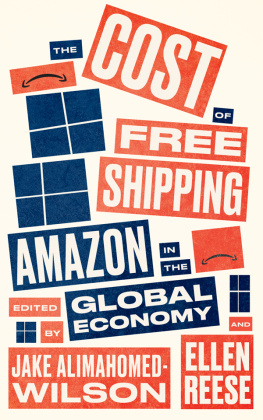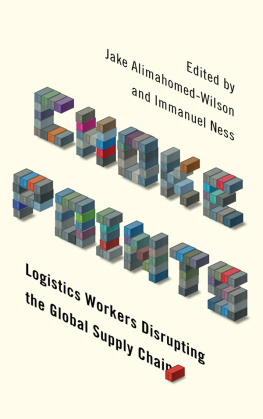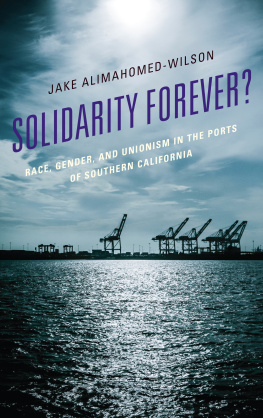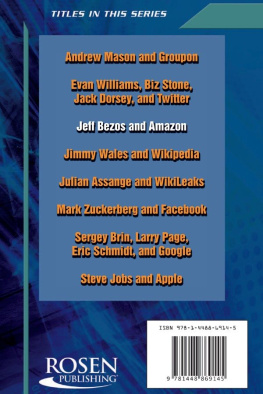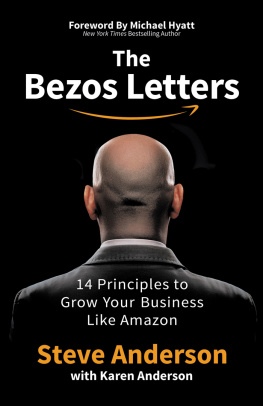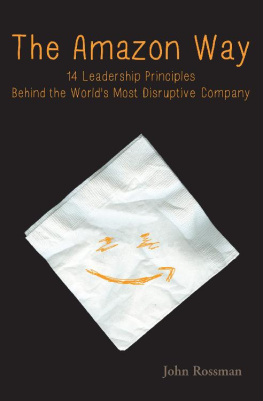Contents
Guide
The Cost of Free Shipping
Wildcat: Workers Movements and Global Capitalism
Series Editors:
Immanuel Ness (City University of New York)
Malehoko Tshoaedi (University of Johannesburg)
Peter Cole (Western Illinois University)
Raquel Varela (Instituto de Histria Contempornea (IHC) of Universidade Nova de Lisboa, Lisbon New University)
Kate Alexander (University of Johannesburg)
Tim Pringle (SOAS, University of London)
Workers movements are a common and recurring feature in contemporary capitalism. The same militancy that inspired the mass labor movements of the twentieth century continues to define worker struggles that proliferate throughout the world today.
For more than a century, labor unions have mobilized to represent the political-economic interests of workers by uncovering the abuses of capitalism, establishing wage standards, improving oppressive working conditions, and bargaining with employers and the state. Since the 1970s, organized labor has declined in size and influence as the global power and influence of capital has expanded dramatically. The world over, existing unions are in a condition of fracture and turbulence in response to neoliberalism, financialization, and the reappearance of rapacious forms of imperialism. New and modernized unions are adapting to conditions and creating class-conscious workers movements rooted in militancy and solidarity. Ironically, while the power of organized labor contracts, working-class militancy and resistance persists and is growing in the Global South.
Wildcat publishes ambitious and innovative works on the history and political economy of workers movements and is a forum for debate on pivotal movements and labor struggles. The series applies a broad definition of the labor movement to include workers in and out of unions, and seeks works that examine proletarianization and class formation; mass production; gender, affective and reproductive labor; imperialism and workers; syndicalism and independent unions, and labor and Leftist social and political movements.
Also available:
Choke Points:
Logistics Workers Disrupting the Global
Supply Chain
Edited by Jake Alimahomed-Wilson and Immanuel Ness
Dying for an iPhone
Apple, Foxconn and the Lives of Chinas Workers
Jenny Chan, Mark Selden and Pun Ngai
Just Work?
Migrant Workers Struggles Today
Edited by Aziz Choudry and Mondli
Hlatshwayo
Wobblies of the World:
A Global History of the IWW
Edited by Peter Cole, David Struthers and Kenyon Zimmer
Southern Insurgency:
The Coming of the Global Working Class
Immanuel Ness
Workers Inquiry and Global Class Struggle
Strategies, Tactics, Objectives
Edited by Robert Ovetz
The Spirit of Marikana:
The Rise of Insurgent Trade Unionism in South Africa
Luke Sinwell with Siphiwe Mbatha
Solidarity
Latin America and the US Left in the Era of Human Rights
Steve Striffler
Working the Phones:
Control and Resistance in Call Centres
Jamie Woodcock
The Cost of Free Shipping
Amazon in the Global Economy
Edited by Jake Alimahomed-Wilson
and Ellen Reese

First published 2020 by Pluto Press
345 Archway Road, London N6 5AA
www.plutobooks.com
Copyright Jake Alimahomed-Wilson and Ellen Reese 2020
The right of the individual contributors to be identified as the authors of this work has been asserted in accordance with the Copyright, Designs and Patents Act 1988.
British Library Cataloguing in Publication Data
A catalogue record for this book is available from the British Library
ISBN 978 0 7453 4147 7 Hardback
ISBN 978 0 7453 4148 4 Paperback
ISBN 978 1 7868 0751 9 PDF eBook
ISBN 978 1 7868 0753 3 Kindle eBook
ISBN 978 1 7868 0752 6 EPUB eBook
This book is printed on paper suitable for recycling and made from fully managed and sustained forest sources. Logging, pulping and manufacturing processes are expected to conform to the environmental standards of the country of origin.
Typeset by Stanford DTP Services, Northampton, England
Simultaneously printed in the United Kingdom and United States of America
Contents
List of Figures and Tables
FIGURES
TABLES
We dedicate this book to all the workers and communities
impacted by Amazon capitalism.
Acknowledgments
The editors wish to acknowledge and thank our families for their support in making this book possible, especially given the many challenges of juggling work, home schooling our kids, and family life amidst the COVID-19 crisis.
First and foremost, Jake is grateful for all the love, support, motivation, and inspiration he received from his partner, Sabrina Alimahomed-Wilson and their two kids, Shanti and Samus, during this entire book project. Jake is also thankful for his parents, Jay and Mary, for their positive encouragement every step of the way. Finally, Jake thanks his wonderful colleagues and amazing students at California State University, Long Beach.
First and foremost, Ellen wishes to thank her partner, Ernest Savage and her son Xavier for their support. Ellen is also grateful for the encouragement she received from her parents, Bill and Emmy, and her colleagues at the University of California Riverside, especially Juliann Allison. Ellen also thanks her UCR undergraduate Sociology 197 student research team who provided valuable research assistance, especially for , as well as other UCR students who helped to inform and shape ideas for this project.
We also want to thank all of the contributors for their amazing chapters and the many workers and activists who shared their stories and insights for this project. Without them, this volume would not have been possible. In addition, we want to thank David Shulman and the entire staff at Pluto Pressit is a privilege to work with all of you. To our anonymous reviewers, and our contributors, Jason Struna, Juliann Allison, and Kim Moody, and Soc 232 graduate students at UCR, we appreciate the feedback you all provided on individual chapters. Were thankful for the support we received from Carolina Bank Muoz, Edna Bonacich, James McKeever, Rebecca Romo, Mike Chavez, Carlotta Benvegn, Haude Rivoal, Niccol Cuppini, David Gaborieau, Kirsty Newsome, Chima Anyadike-Danes, Kent Wong, Stephanie Luce, Bill Fletcher Jr., Peter Cole, Robert Ovetz, Spencer Potiker, and Immanuel Ness. Finally, we also thank Shaafi Farooqi for her wonderful copy-editing assistance.
Preface
Amazon and the Future of Work
in the Global Economy
Ruth Milkman
Jeff Bezos, now the worlds richest individual, launched Amazon as an online bookstore in 1995. Over the next quarter-century it grew into an e-commerce behemoth, offering rapid home delivery of an ever-expanding range of products and servicesfrom A to Z, as its logo promises; its 2017 acquisition of Whole Foods made it a major player in food delivery as well. Critical to Amazons business model are its massive warehousing and logistics operations; its cloud computing division is also a key profit center. The COVID-19 pandemic accelerated the spectacular growth of what this books editors call Amazon capitalism, as demand for home delivery surged while countless brick-and-mortar retailers were forced to close.

